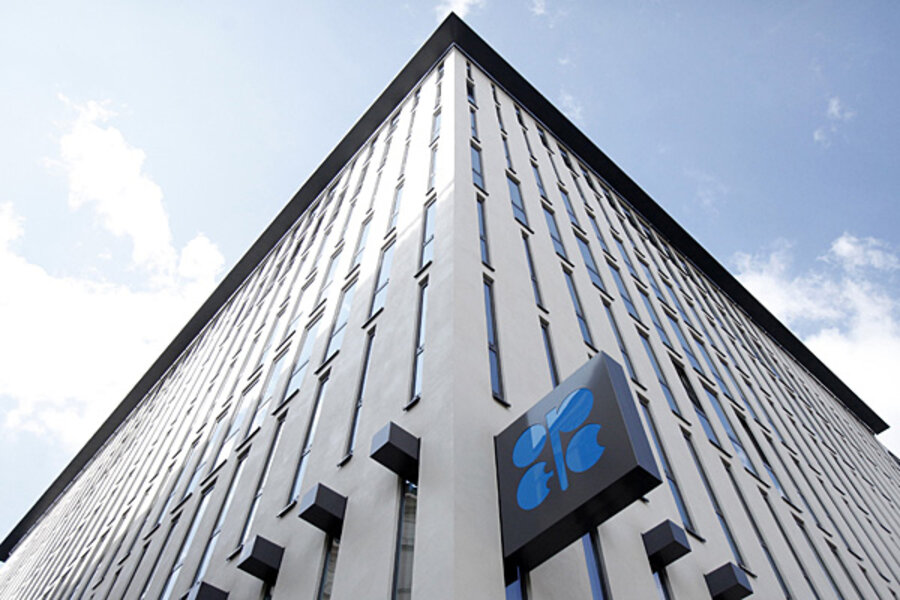Is OPEC coming apart at the seams?
Loading...
Growing security risks in the Middle East are giving oil companies the jitters. French supermajor Total said recently that it was spending more on security since the January attack on the In Amenas gas facility in Algeria. BP said it had its own concerns, noting it was holding back on natural gas projects in the country because of the security situation there. OPEC-member Algeria has seen production declines in every month so far this year. In a lackluster economy, there hasn't been much from OPEC members to suggest there was any sort of revival. But with seven of the 12 members of the cartel experiencing at least some form of upheaval, the cost of doing business suggests members may need more than a little bit of luck to return to glory.
In January, fighters affiliated with al-Qaida stormed the In Amenas natural gas facility in Algeria. The facility is operated by British supermajor BP, Norwegian energy giant Statoil and Algerian state-owned oil and natural gas company Sonatrach. A four-day operation by Algerian forces left dead more than two dozen militants and 37 hostages, some of them energy company employees. The attack was perpetrated by an al-Qaida group, dubbed Those who Sign with Blood, from across the border in Libya. (Related article: Saudis Dare U.S. to Play Oil Ball)
Four months on and energy companies working in the region are expressing concern that the cost of doing business in the region may be too high. BP suspended an oil contract in Libya when civil war descended on the country in 2011. By last year, it said the situation there had approved enough to consider exploratory drilling but backed off again after the cross-border attack in January. It's Algeria's turn this time around, with BP saying it was reviewing its plans to develop natural gas fields in the country.
For Total, the situation isn't much different. The Algerian attackers suggested their assault was in response to the French decision to enter the fight in Mali, where al-Qaida seized territory following a 2012 coup. Now, Total said it has to spend extra money on security in the Middle East to continue operating there, more than two years after the so-called Arab Spring splashed its democratic wave across much of the region. Algeria is one of the major suppliers of natural gas to the European community. While some analysts suggest recent discoveries mark a rebound for Algeria, Total's spending woes and BP's chin scratching may indicate there are still some lingering concerns less than four months after the terrorist attack. (Related article: Saudi Arabia’s Diminishing Influence in the Oil Market)
But it's not just Algeria. Lawmakers in Venezuela were bloodied in a punch up following an election to replace Hugo Chavez. Sanctions on Iran, meanwhile, have forced many of its oil and natural gas customers away because of the economic risks of doing business. In Nigeria, the United Nations said it was deeply concerned about the bloodshed that followed a military attack on Boko Haram, a militant group with ties to al-Qaida. Rights groups, meanwhile, pressured British Prime Minister David Cameron to address the human rights situation in the United Arab Emirates, where some observers saw the recent arrest of al-Qaida sympathizes as a cover-up for repression. French concerns extended beyond Mali and Total's, meanwhile, when a car bomb ripped through part its embassy in Tripoli and April was the deadliest month in Iraq in roughly five years. Including Algeria, that's seven of the 12 members of OPEC embroiled in some degree of turmoil.
Saudi Oil Minister Ali al-Naimi, in a much publicized speech last week, said there are no major plans to increase production capacity. Saudi Arabia will "be lucky" if it breaks the 9 million bpd mark by 2020, he said. Taking Iraq as a bellwether of how long it takes to sort out a post-war mess, he made need more than a bit of luck to revitalize the once-dominate OPEC cartel.
Original source: http://oilprice.com/Energy/Crude-Oil/OPEC-Falling-Apart-at-the-Seams.html







